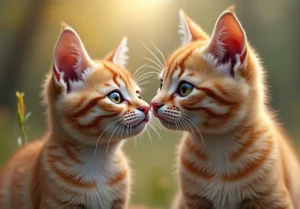Cats are known for their mysterious behavior and unique vocalizations, especially at night. Have you ever wondered why cats seem to be more vocal during the nighttime hours? Let’s explore the reasons behind this curious feline behavior.
Natural Instincts
Cats’ nocturnal vocalizations can be linked to their innate hunting instincts. These instincts are deeply ingrained in cats, even those who are domesticated. Cats are natural predators, and their ancestors primarily hunted at night, which has influenced their behavior to be more active and vocal during nighttime hours. This behavior may stem from their evolutionary past, where they used vocalizations to communicate with other members of their hunting pack or to strategize during nighttime hunts. Therefore, when your feline friend is meowing loudly at night, it could be a manifestation of these primal instincts at play.
Additionally, cats have heightened senses at night. Their keen sense of hearing and exceptional night vision make them more alert when the sun sets. As a result, they may feel compelled to vocalize more during this time, as they are more receptive to the sounds around them. This heightened awareness can also make them more responsive to stimuli in their environment, such as other animals or even changes in their territory, which may prompt increased vocalizations.
Territorial Behavior
A key factor that can contribute to cats being more vocal at night is their territorial nature. Cats are known to be highly territorial animals, and they use vocalizations as a way to mark their territory and communicate with other cats in the vicinity. After dark, when the world quiets down and other animals become more active, cats may feel the need to assert their presence and defend their territory through vocal means.
Furthermore, cats are more active at night due to their crepuscular nature, which means they are most active during dawn and dusk. This increased activity level can also lead to more vocalizations during the night, as cats may be more inclined to engage in territorial disputes with other animals or simply communicate with their feline neighbors.
To address your cat’s nighttime vocalizations, ensure they have plenty of mental and physical stimulation during the day to help expend their energy. Providing interactive toys, playtime, and even puzzle feeders can help keep them engaged and satisfied, potentially reducing their nighttime vocalizations.
Communication Signals
Cats are more vocal at night because they use meows, yowls, and other vocalizations to communicate. When the sun goes down, cats rely more on vocal signals to express their needs, feelings, and desires to their owners or other cats. Meowing at night can indicate a variety of things, such as seeking attention, expressing hunger, signaling distress, or simply wanting to engage in social interactions. Understanding the different vocalizations of cats can help decipher their nighttime communication and build a stronger bond with your feline friend.
Unique Insight: The pitch, duration, and intensity of a cat’s vocalization can indicate the urgency and importance of their message. Pay attention to these subtle variations in their meows and yowls to better understand what your cat is trying to communicate.
Attention-Seeking Behavior
At night, cats may become more vocal as a way to seek attention from their owners or other feline companions. Cats are crepuscular animals, meaning they are most active during dawn and dusk, which can coincide with nighttime hours. Increased vocalizations during the night may be a way for cats to connect with their human companions, solicit playtime, or simply express their presence. Responding to your cat’s nighttime vocalizations with attention and affection can reinforce their behavior and strengthen your bond.
- Engage in interactive play sessions with your cat during the evening to provide mental and physical stimulation.
- Create a consistent nighttime routine for feeding, playtime, and cuddling to help alleviate attention-seeking behaviors.
- Provide engaging toys and scratching posts to keep your cat entertained during the night.
Remember, understanding your cat’s vocalizations at night can help enhance your relationship and ensure a harmonious coexistence during those late-night hours.
Environmental Factors
At night, when the world goes quiet and dark, cats’ instincts kick in, making them more vocal. The reduced activity levels of humans and other animals can make your cat feel more alert and wanting to communicate. Cats are crepuscular creatures by nature, meaning they are most active during dawn and dusk. So, when the day winds down and the night sets in, your cat might be feeling more energized and chatty. Keep this in mind when wondering why your furry friend becomes a nighttime chatterbox.
Social Interaction
Whether it’s wanting attention or responding to your movements, cats can become more vocal at night due to their social interactions. If your cat is seeking your company or trying to communicate with other animals in the neighborhood, they may be more likely to meow when it’s dark outside and the house is quiet. So, don’t be surprised if your cat starts chatting up a storm when they sense your presence at odd hours. Remember, cats are creatures of habit and often treat nighttime like prime-time for bonding or making their presence known.
Additional Unique Insight:
– Cats may vocalize more at night as a way to mark their territory audibly, especially if they perceive a potential threat in the quiet darkness.
Remember, understanding why your cat is more vocal at night can help you better respond to their needs and strengthen your bond with your feline companion.
Health Issues
Cats can become more vocal at night due to underlying health issues that may cause discomfort or distress. If your feline friend is consistently meowing during the night, it could be a sign that something is amiss. Common health issues that may lead to increased vocalization at night include urinary tract infections, arthritis, hyperthyroidism, dental problems, or cognitive dysfunction.
In some cases, older cats may experience cognitive dysfunction syndrome, similar to Alzheimer’s disease in humans, which can disrupt their sleep-wake cycles and cause confusion or anxiety at night. Additionally, cats with thyroid imbalances or chronic pain conditions may also vocalize more frequently during the night.
If your cat’s nighttime vocalizations are unusual or excessive, it’s crucial to consult with your veterinarian to rule out any potential health issues. Addressing the underlying cause of your cat’s nighttime meowing is essential to ensure your furry companion receives the necessary care and treatment to improve their well-being and quality of life.
Tips for Managing Nighttime Vocalizations
Dealing with a chatty cat in the wee hours of the night can be exhausting for both you and your pet. Here are some practical tips to help you manage your cat’s nighttime vocalizations and promote a peaceful sleep environment for everyone:
Establish a bedtime routine : Create a consistent bedtime routine for your cat to help them feel secure and relaxed before going to sleep. Engage in calming activities such as playing with interactive toys or gentle petting to help your cat wind down.
Provide mental and physical stimulation : Keep your cat mentally and physically engaged during the day to prevent boredom and excess energy that may lead to nighttime vocalizations. Interactive toys, scratching posts, and play sessions can help tire out your cat before bedtime.
Avoid reinforcing meowing : While it may be tempting to respond to your cat’s meows with attention or treats, avoid reinforcing this behavior at night. Instead, wait for a moment of silence before offering any rewards, to discourage nighttime meowing.
Create a comfortable sleep environment : Ensure your cat has a cozy and quiet sleeping area away from disruptions that may trigger their vocalizations. Consider providing a warm bed, soothing music, or a nightlight to help your cat feel more secure at night.
Consult with a veterinarian : If your cat’s nighttime vocalizations persist despite trying various strategies, consult with your veterinarian to rule out any underlying health issues or discuss potential behavioral interventions.
By understanding the reasons behind your cat’s nighttime vocalizations and implementing these practical tips, you can help create a peaceful and restful nighttime routine for both you and your feline companion.
Fun Facts About Cat Vocalizations
Have you ever wondered why cats seem to be more vocal at night, especially when the moon is high in the sky? Well, it turns out that there are some fascinating facts about cat vocalizations that may shed some light on this behavior. Cats are known to use a wide range of vocalizations to communicate with their owners and other feline friends. From meows to purrs, each sound has a unique meaning and purpose.
One interesting fact is that cats use different types of vocalizations depending on the situation. For example, a cat may use a high-pitched meow to get your attention or a low growl to express displeasure. When the night falls, cats may become more vocal as a way to communicate with other cats in the area or to express their nocturnal instincts.
Another fun fact is that some cats are more vocal than others by nature. Certain breeds, such as Siamese cats, are known for being chatterboxes and may meow more frequently, especially at night. This could explain why some cats are more vocal during the nighttime hours compared to others.
So, the next time your feline friend decides to serenade you in the middle of the night, remember that it’s just their way of communicating and expressing themselves in the unique language of cat vocalizations.
- Cats may use purring not only to show contentment but also to soothe themselves when they are anxious or in pain. So, if your cat purrs a lot at night, it might be their way of self-soothing during the quieter hours.
Alex, a passionate animal lover, has experience in training and understanding animal behavior. As a proud pet parent to two dogs and three cats, he founded AnimalReport.net to share insights from animal experts and expand his knowledge of the animal kingdom.




